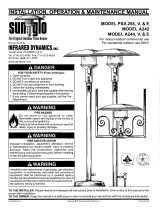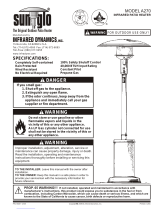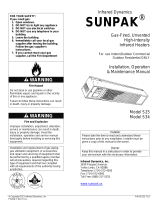Page is loading ...

INSTALLATION, OPERATION & MAINTENANCE MANUAL
Sunglo Patio Heaters
MODEL PSA265 (V,E)
MODEL A242
MODEL A244 (V,E)
NOT FOR USE IN RESIDENTIAL DWELLINGS
DANGER
Manufactured by
Infrared Dynamics, Inc.
Yorba Linda, CA 92886 U.S.A
Toll Free (888) 317-5255
www.infradyne.com
FOR YOUR SAFETY – If you smell gas;
1. Open windows.
2. DO NOT try to light any appliance.
3. DO NOT use electrical switches
4. DO NOT use any telephone in your building
5. Leave the building immediately
6. Immediately call your local gas supplier after leaving
the building. Follow the gas supplier instructions.
7. If you cannot reach your gas supplier, call the Fire
Department.
WARNING: FIRE HAZARD
Do not store or use gasoline or other
flammable vapors and liquids in the vicinity of
this or any other appliance.
Failure to follow these instructions can result
in death, injury or property damage.
WARNING: FIRE AND EXPLOSION
Installation and replacement of gas piping, gas utilization
equipment, or accessories, and repair and servicing of
equipment shall be performed by a qualified agency
familiar with all precautions required regarding type of
equipment and that has complied with all requirements
of the authority having jurisdiction.
WARNING: California Prop 65
If not installed, operated and maintained in accordance with
the manufacturer’s instruction, this product can expose you to
substances in the fuel or from combustion including carbon
monoxide which can cause death or serious illness and which
are know to the State of California to cause cancer, birth
defects or other reproductive harm. For more information go
to www.P65WARNINGs.CA.GOV
TO THE INSTALLER: Please read and understand all instructions prior to installation. Give a copy of this
manual to the owner after installation.
TO THE OWNER: Keep this manual in a safe place to retain for future reference
P/N: 65132-12/17 Copyright © 2018 By Infrared Dynamics, Inc. Printed in USA

OWNER’S MANUAL
Before Starting Your Heater
Before you start your heater examine the heater
installation to determine that;
• Areas immediately around the heater including
the air inlet and the flue areas are free from
obstructions
• There is no obvious deterioration of the heater.
• Portable type heaters must be placed on level
and adequate footing.
Starting and Shutting Down Your Heater
Sunglo heaters can utilize a variety of gas control
systems. With some models it is necessary to manually
light a pilot. Other models have a fully automatic
ignition system. Identify the model of your heater on
the Basic Lighting instructions chart on page (*??) and
follow the lighting instructions. If heater fails to light
or does not heat properly discontinue use of the
heater and contact your local distributor, or qualitied
service agency.
Performing Routine Maintenance
Overtime, particularly during longer periods of disuse,
the heater can accumulate dirt and debris in and
around the pilot and burner. Routine maintenance
should be performed at least once a year by a
qualified service technician to insure the heater is
operating properly. More frequent service may be
required for heaters located near waterfronts
Warning Labels
It is important that warning labels including the
lighting instructions are not removed from the heater.
If labels are damaged, replacement labels are available
from your local dealer or from the factory
Stainless Steel Care
Stainless steel needs to be cared for like any other
surface. We recommend washing the stainless-steel
post and base with a mild detergent solution, and
applying a stainless cleaner to bring back the original
shine. The stainless steel may be expected to
permanently darken around the top of the heater.
Before You Remodel
If you plan to make changes to the patio or building
structure after the heaters have been installed, your
heater installation must be reviewed by a qualitied
agency to ensure that clearances from combustible
materials and ventilation requirements are maintained after
alterations are complete. When plastic curtains or drops are
used to enclose a patio, you must take steps to ensure that
all Sunglo heaters have the required permanent access to
outside air. If the patio is to be partially enclosed a qualitied
agency familiar with this type of heating equipment must be
consulted to ensure the safe operation of the equipment.
Warning
Improper installation, adjustment, alteration,
service or maintenance can result in death,
injury or property damage. Read instructions
thoroughly before installing or servicing this
equipment.

HEATER LAYOUT AND PATIO DESIGN
There are a number of
considerations in determining
the type and number of heaters
to be used and their best
location on your outdoor patio.
Concept of Patio Heating. Hot
air from conventional heaters is
not an option for heating an
outdoor patio so a patio heater
uses radiant heat like we receive
from the sun
Radiant Heat: Is the type of
heat you receive from a fireplace,
potbelly stove, or the sun. It is an
infrared wave length that heats
objects without first heating the
intervening air. Unlike ultraviolet
light there is no sunburn or sun
tanning affect. Infrared will not
attract insects
Patio Heater: Is an unvented
gas-fired infrared heater
designed to concentrate
radiant heat in outdoor areas.
Definition of Outdoors: (for
the purpose of these
instructions). An appliance is
considered to be outdoors if
installed with shelter no more
inclusive than:
1. With walls on all sides
but with no overhead
cover.
2. Within a partial
enclosure which
includes an overhead
cover and no more
than two side walls.
The side walls may be
parallel, as in a breeze
way, or at right angles
to each other.
3. Within a partial
enclosure which
includes an overhead
cover and up to three
side walls, as long as
30% or more of the
horizontal periphery
of the enclosure is
permanently open.
WHERE TO LOCATE PATIO
HEATERS:
Sunglo™ Heaters naturally attract
people to their infrared warm glow.
Located heaters where people can
readily gather, sit or stand comfortably,
and where furnishing can easily be
moved to best accommodate the
radiating warmth.
GENERAL RULES FOR
LOCATING HEATES:
A Sunglo™ Patio Heater can operate
effectively to maintain comfort even in
completely exposed areas, although
weather protected areas are desirable.
Weather and wind protection allows
the air to be warmed to enhance the
direct radiant warming effect.
Breezy Conditions:
Sunglo™ heaters are designed to work
well under a variety of outdoor
conditions. However, wind and other
weather conditions will affect how well
the heater operates, or if it should be in
use at all. The heater can be safely
operated when the cross wind or
breeze is 0-10 mph. If heaters are
mounted on the edge of a precipice or
sea cliff where wind is directed upwards
into the reflector hood, damage to the
heater will occur. Upward thrusts of
wind can also occur because of wind
walls or other architectural elements
near the patio. The patio should be
designed to protect the heaters against
this type of condition.
Using Multiple Heaters:
When more than one heater is used in
an area, it is generally preferable to
locate them close together. Multiple
heaters located on 8’ to 15’ centers will
give overlapping heat patterns,
increasing the overall effective coverage
for each heater.
CONTROL SYSTEMS:
Sunglo™ heaters are available with a
variety of control systems from manual
controls requiring no electrical
connections to a 24 VAC fully automatic
ignition and control system (see Basic
Lighting instructions on page *). It is
recommended that when multiple
heaters are used, that the electrical
circuitry be arranged so heaters can be
switched on and off individually or in
groups to provide maximum flexibility
for heating the patio.

INSTALLATION AND SERVICE INSTRUCTIONS
Receiving Equipment
On receipt of equipment it is suggested that a visual
inspection be made for external damage to the carton.
If the carton is damaged, a note should be made on
the Bill of Lading when signing for the equipment.
Remove the heaters from the carton. If there is
damage, report the damage to the freight carrier
immediately.
Each Sunglo™ heater is carefully tested and adjusted
at the factory. Before attempting to install this
equipment a thorough inspection is required to insure
the heaters are in the original condition from the
factory. Check for any loose parts or damage such as
dents or parts that may affect the operation of the
heater. If there is any question in regards to the
condition of the equipment, contact the factory.
INSTALLATION INSTRUCTIONS
Important Notice
These instructions are intended for qualified
personnel, specifically trained and experienced in the
installation of this type of equipment and related
system components. Some states or provinces require
installation and service technicians to be licensed. If
your state or province is such, be sure your contractor
bears the appropriate license. Persons not qualified
shall not attempt to install this equipment nor attempt
repairs.
Code Requirements
Installation must be in accordance with local codes, or
in absence of local codes, with the latest edition of the
National Fuel Gas Code, NFPA 54/ANSI Z223.1 and the
National Electrical Code ANSI/NFPA 70, and for
Canada, the latest edition of CAN/CGA-B149.1 and
B149.2 and Canadian Code CSA C22.1 Part 1 and Part
2.
Heaters to be installed in Aircraft hangars must be
installed in accordance with the American National
Standard for Aircraft hangars, ANSI/NFPA No. 409.
Heaters to be installed in Public Garages must be
installed in accordance with NFPA No. 88A, Standards
for Parking Structures.
Heaters must be installed so that minimum clearances
marked on the heater will be maintained from vehicles
parked below the heater.
When an external electrical source is utilized each
heater must be electrically grounded in accordance
with the National Electrical Code ANSI/NFPA 70. In
Canada, the Canadian Electrical Code CSA C22.1 Part 1
applies.
Gas Supply
The gas inlet supply pressure and manifold
pressure required for each heater are listed
below. For gas supply line pressures in excess of
½ psig, consult your natural gas representative or
the factory.
Gas Inlet Pressure Nat Gas Propane
Maximum Pressure ½ psig 11 » W.C.
Minimum Pressure 6 » 11 W.C.
Manifold Pressure 5 » W.C. 11 » W.C.
It is important that the gas piping system be
adequately sized for all the gas appliances it
serves.
Clearance Requirements
Each heater must be installed such that the
following “Minimum Clearances from
Combustible Materials” are always maintained.
Combustible materials include all wood,
compressed paper, plant fibers, plastics, Plexiglas
and other materials capable of being ignited or
burned. Such materials shall be considered
combustible even though flame-proof, fire
retardant treated or plastered. Additional
clearance may be requited for vinyl siding, glass,
painted surfaces or other materials that may be
damaged by radiant or convection heat.
Clearance from Combustibles
Top
Side
Below
Fire Sprinklers
Fire Sprinklers must be located at an appropriate
distance from each heater to avoid accidental
activation of the sprinkler. Ethylene glycol or
propylene glycol must never be used in fire
sprinkler systems where heaters are present, as
these substances may become flammable when
heated. A fire sprinkler professional must be
consulted when heaters are installed to insure
heaters and fire sprinklers are properly
integrated. Specific guidelines can be found in
NFPA 13, Installation of Fire Sprinkler Systems.


Electrical (V,E) Models Only
These heaters require 24 VAC to operate. The
installer must provide a NEC Class 2 transformer.
Each heater requires 20VA or 0.8 amperes (AMP).
When multiple heaters are connected to one
transformer, that transformer must be sized to
accommodate the entire electrical load.
Control wire used to electrically connect one or more
heaters together must have adequate capacity and
insulation temperature rating for the total connected
load. Use at least 18 GA wire up to 50 feet from the
heaters to the transformer or wall switch. Use
minimum of 16 GA wire for over 50 foot distances.
If any of the original wire supplied with the heater
must be replaced, it must be replaced with wiring
having a temperature rating of at least 105
centigrade.
Ventilation
1. It is required that areas above and below
the heater be properly vented to allow for
necessary combustion air and removal of
combustion gases.
2. Heater shall be provided with natural or
mechanical means to supply and exhaust at
least 4 cfm per 1,000 BTU per hour of heater
input. Exhaust opening for removing the flue
products shall be above the level of the
heaters.
3. Heater ventilation must comply with state
and local codes.
Gas Piping
1. A minimum pipe size of ½” is required for
inlet piping. A ½” lever handled shut-off gas
cock must be installed within 6 feet of the
heater for servicing the unit.
2. Gas lines must be adequately sized to carry
the total connected gas load. Check with
local and state plumbing and heating codes
regarding sizing of gas line.
3. All gas pipe connections to the heater(s)
must be sealed with a gas pipe compound
resistant to liquefied petroleum gases.
4. Installation of a drip leg in the gas supply
line going to each heater is required to
minimize the possibility of any loose scale or
dirt within the gas supply line from entering
the heater’s control system.
5. When checking for gas leaks do not use an
open flame. Use a soap and water solution.
6. 6. For gas supply line pressures in excess of
½ psig, consult the factory or your local
natural gas representative.
7. Installation of a 1/8” N.P.T. plugged tapping
accessible for test gage connections is
required upstream of the gas supply
connections to the heater.
Initial Start-Up Procedure
1. Make sure the gas lines are completely purged of air
before attempting to light heater.
2. Follow lighting instructions on page ?? for your particular
model.
3. Check all gas connection for leaks using soapy water.
4. Flame should travel completely around the inside of the
emitter grid.
5. Emitter grid should become RED within 5 minutes (this
may be difficult to see in bright sunlight).
NOTE: Some white smoke may appear during or just after the
initial start-up of the heater. White smoke will dissipate with
procedure.
Servicing Instructions
Service checks on these heaters should be preformed at least
annually or more frequently depending on their use to verify
the proper operation of these heaters. If the pilot fails to light
or the heater does not heat properly the heater must be
repaired before being put back into service.
1. Turn off gas and electrical before attempting to any
service.
2. Remove reflector and emitter assembly from heater as
shown on page (**)
3. Using low pressure air (maximum of 30 psig) clear
burner and pilot of any dirt or debris. NOTE:
Appropriate eye protection must be worn).
4. Using a metal brush remove any accumulated dirt from
the inside of the emitter grid.
5. Reassemble heater and observe whether heater has
been restored to proper operation.
6. 6. If heater does not operate properly it may be
necessary to remove burner and orifice for cleaning.
7. Any corroded or deteriorated parts must be replaced.
LIMITED WARRANTY

THIS WARRANTY IS APPLICABLE TO THE ORIGINAL OWNER ONLY in accordance with the warranty terms
and conditions specified below.
One year Homeowner Warranty/90 Day Commercial Warranty
Infrared Dynamics (warrantor) will furnish the original owner replacement parts for any component part
which fails before one year of residential use, or 90 days of commercial use, following installation. At our
option, Infrared Dynamics may offer to rebuild or replace the heater within the limited warranty period.
Installation, use and maintenance must be in accordance with instructions contained in the installation
instructions.
THE WARRANTY DOES NOT COVER
-Service and labor costs incurred for diagnosing, removing, or reinstallation of the heater(s) or parts(s)
thereof.
-Shipping and delivery charges for defective parts or the heater to nearest distributor or manufacturer
to the claimant. Any costs pertaining to permits or materials for installation of the heater or parts.
-Any product purchased over the Internet, or purchased second hand.
-Damage or repairs due to faulty installation, misapplication, negligence, thermal shock, earthquake,
fire, flood, and/or purposeful damage to the heater.
-Failure to work due to electrical service including voltage conditions, blown fuses or circuit breakers, or
damage due to the inadequacy or interruption of electrical service.
-Failure to work due to a break or interruption in natural gas or propane lines to the heater.
GENERAL CONDITIONS PERTAINING TO WARRANTY
The warranty shall be null and void if the heater is not installed by an experienced heating contractor, or
if the heater is not installed according to the Installation Instructions, normal industry practices, and/or
if the heater is not maintained and repaired according to the instructions.
Normal product wear (oxidation, scratches, battery replacement, etc.) does not constitute a material
defect and applicable warranty claim.
Written permission is required for the return of any parts or equipment and any such return must be
made on the basis of transportation charges prepaid. Shipment may be refused unless prior written
permission is obtained and goods returned prepaid.
LIMITATION ON IMPLIED WARRANTIES
Implied warranties, including any warranty of merchantability imposed on the sale of this heater under
state law are limited to one year duration for the heater or any of its parts. Some states do not allow
limitations on how long an implied warranty lasts.
CLAIMS PROCEDURE
Any claim under this warranty should be initiated with the dealer who sold the heater, or with any
dealer handling the warrantor’s products. If this is not practical, the owner of the heater should contact:
Infrared Dynamics, 3830 Prospect Ave. Yorba Linda, California 92886. Toll Free: 1-888-317-5255. Hours
of operation 7-3 PST MF). Website: www.infradyne.com.

/







